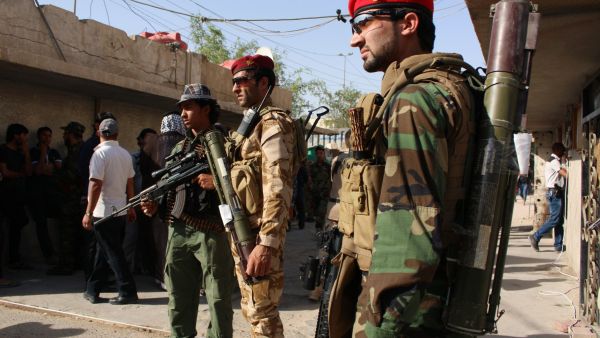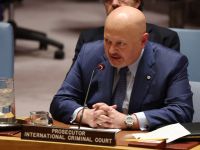About 800 Iraqi forces backed by U.S. warplanes are waging a battle to retake the western town of Al-Baghdadi from ISIS jihadis, a U.S. military commander said Monday.
The clashes came as new U.S. Defense Secretary Ash Carter convened an extraordinary war council on Iraq’s doorstep six days after taking office, gathering military and diplomatic leaders to discuss the Obama administration’s oft-criticized strategy for countering ISIS.
Kurdish militia, meanwhile, rebuffed an attempt by the ISIS group Sunday night to recapture an Iraqi town standing on a crucial supply route to the northern city of Mosul, the commander said.
Lt. Gen. James Terry, who oversees the U.S.-led war effort against ISIS, told reporters the jihadis had been “halted” across Iraq and that it was now only able to launch smaller-scale attacks.
Terry, who is headquartered in Kuwait, said that while the ISIS militants are under mounting pressure, the Iraqi army was improving.
“The capabilities that we’re seeing in the Iraqi security forces are growing,” the general said.
“At the same time, what we’re not seeing on the part of Daesh [ISIS] is as important also. We’re not seeing those broad counter-offensives” that they staged previously, he said.
Iraqi army and commando units, as well as tribal fighters, were currently carrying out an operation to retake the small town of Al-Baghdadi which ISIS had seized about a week ago, according to Terry.
The counterattack, dubbed “Lion’s Revenge,” involved “well over 800” Iraqi forces, including mechanized units.
The town is located near the Iraqi army’s Al-Asad base, where 300 U.S. troops are stationed to advise and train local forces.
A group of about 20-25 ISIS fighters – including several suicide bombers – staged an attack on the Asad base this month but the assault was quickly crushed.
Coalition warplanes have carried out about 10 “precision strikes” against ISIS in recent days to support the Iraqi operation near Al-Baghdadi, Terry said.
“I’m pretty confident that the Iraqis will retake this. I think they have the right forces out there to do it,” he said at a briefing at the U.S. Army base of Camp Arifjan in neighboring Kuwait. Terry also said the ISIS jihadis Sunday night staged an unsuccessful bid to recapture the town of Kaske, which straddles a strategic route to Mosul – an ISIS stronghold.
Kurdish forces repulsed the attack backed by U.S.-led aircraft, Terry said.
He said the ISIS suffered heavy losses, with an estimated 127 fighters killed.
Heavy clashes raged in northeastern Syria on Monday as Kurdish fighters and ISIS militants battled for control of a string of villages near the Iraqi and Turkish borders.
Monday’s fighting focused in Hassakeh province in the extreme northeast of Syria, where ISIS militants took at least one village near the small town of Tal Tamr, the Britain-based Syrian Observatory for Human Rights and the Local Coordination Committees activist collective said. Tal Tamr is some 85 kilometers southwest of the provincial capital of Qamishli.
The SANA state news agency said the extremists attacked seven villages in all, forcing hundreds of people to flee.
The ISIS gains came a day after Kurdish militiamen from the People’s Protection Units, or YPG, captured around 20 villages southeast of Qamishli in a new offensive against ISIS. Heavy fighting broke out again Monday, activists said.
In one border village of Solaymah, captured by the YPG from ISIS, shelling from peshmerga on the Iraqi side killed eight civilians, including five children, the Observatory reported. It was unclear why the peshmerga attacked the village after it had been taken by the Syrian Kurds.
Carter left Monday’s war council suggesting the U.S.-led anti-ISIS approach is mostly on track.
“The discussion indicated clearly to me that this group [ISIS] is hardly invincible,” Carter told reporters after six hours of closed-door talks with the officials he dubbed “Team America.”
He gave no indication that he that he thinks the strategy needs an overhaul.
“Our discussion this afternoon affirmed the seriousness and the complexity of the threat posed by[ISIS], especially in an interconnected and networked world,” he said, using an alternate acronym for the militants. “Lasting defeat of this brutal group can and will be accomplished.”
Carter said the U.S.-led aerial bombing campaign in Iraq is going well, and he expressed confidence that the U.S. military is well suited to carrying out a longer-term effort to train and equip an opposition rebel force in Syria. He specified two areas for needed improvement in the overall strategy: more creative use of social media to counter ISIS’ messaging campaign, and getting more out of some coalition member countries, which he did not name.
France boosted its participation Monday with the Charles de Gaulle aircraft carrier launching raids against ISIS.
Carter said he assembled U.S. generals, diplomats and intelligence officials not just to hear the latest on battlefield progress but also to better understand the intellectual underpinnings of Obama’s counter-ISIS strategy, including the ways military force is supposed to combine with political and economic measures to reverse ISIS’ gains and eventually defeat it.
During a brief picture-taking session as the talks began, Carter said he needs to better understand what he called the “very complicated” problem of an Islamist extremist group “spreading echoes and reflections around the world.” He added, “It is a problem that has an important military dimension, but it’s not a purely military problem – it’s a politico-military problem.”
Seated around a large T-shaped table were about 25 senior officials, including Gen. Lloyd Austin, head of the military’s Central Command; presidential envoys John Allen and Brett McGurk; the commanders of U.S. forces in Europe and Africa, and U.S. ambassadors from the Middle East.
“This is Team America,” he said.
The gathering was a highly unusual way for a Pentagon chief to begin his tenure. Aides said participants were told in advance to leave their usual talking points at home and be prepared for a freewheeling discussion.
In remarks to troops at Camp Arifjan before the conference began, Carter said that the key to success against ISIS militants is ensuring that the countries threatened by the group can preserve the gains achieved by the U.S.-led military campaign.
“We will deliver lasting defeat, make no doubt,” Carter said, adding, “It needs to be a lasting defeat.”








